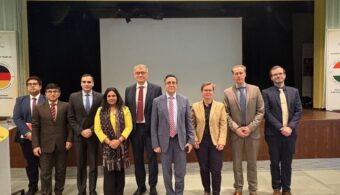Commerce and Industry Minister Piyush Goyal has said that India and the European Union (EU) are close to “substantially concluding” negotiations on a long-awaited Free Trade Agreement (FTA). His remarks come ahead of the visit of EU Trade Commissioner Maros Sefcovic and Agriculture and Food Commissioner Christophe Hansen, who will arrive in New Delhi on September 12–13 to lead high-level talks.
EU Delegation to Hold Bilateral Talks
The EU Embassy in India confirmed in a post on X that the two Commissioners will meet Minister Goyal, review progress in the trade talks, strengthen economic ties, and interact with key business stakeholders during their two-day visit.
Minister Goyal is scheduled to meet the visiting EU leaders on Friday, September 13, after the 13th round of negotiations began on Monday, September 8 in New Delhi.
Negotiations Progressing Rapidly
Briefing reporters on Tuesday, September 9, Minister Goyal said that nearly 60–65 per cent of the chapters under discussion have been finalised. “By the time my counterparts arrive, I think we will be well set to substantially conclude the agreement,” he noted.
The 13th round of negotiations covers 23 policy areas including trade in goods and services, investment, intellectual property rights, geographical indications, customs, and sustainable development.
German Support to Push FTA
Earlier this month, German Foreign Minister Johann Wadephul expressed Berlin’s strong support for the FTA during his meeting with External Affairs Minister S. Jaishankar in New Delhi. He stressed that Germany would use its influence within the European Commission to accelerate the agreement.
“Germany is a free-trade nation, and we consider this agreement with India the most important. We will use every argument we have to move this forward,” FM Wadephul said.
Roadmap and Challenges
Negotiations on the India–EU FTA were resumed in June 2022 after an eight-year hiatus. The 12th round of discussions was held in Brussels, while both sides are now working towards a deadline to conclude talks by the end of 2025, as agreed between Prime Minister Narendra Modi and European Commission President Ursula von der Leyen on February 28.
While progress has been made, sticking points remain. The EU is demanding tariff reductions in automobiles, medical devices, wines, spirits, and poultry, along with a stronger intellectual property regime. India is seeking greater market access for its exports such as garments, pharmaceuticals, steel, petroleum products, and machinery.
Growing Economic Importance
Trade between India and the EU continues to grow. Bilateral trade in goods reached USD 136.53 billion in FY 2024–25, with Indian exports at USD 75.85 billion and imports at USD 60.68 billion. The EU accounts for nearly 17 per cent of India’s exports, making it the country’s largest trading partner for goods.
In the services sector, bilateral trade was estimated at USD 51.45 billion in 2023, reflecting the depth of engagement between the two economies.
Outlook
The outcome of this week’s talks will be pivotal in determining whether India and the EU can finalise the deal within 2025. A successful conclusion would mark one of the most significant trade milestones for India in recent years, reshaping its economic relationship with Europe for decades ahead.



